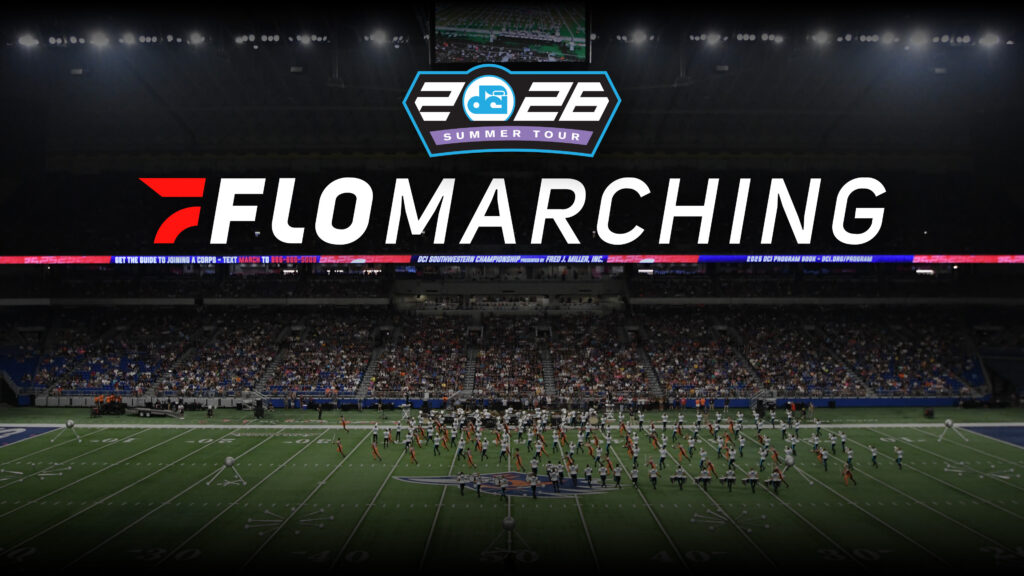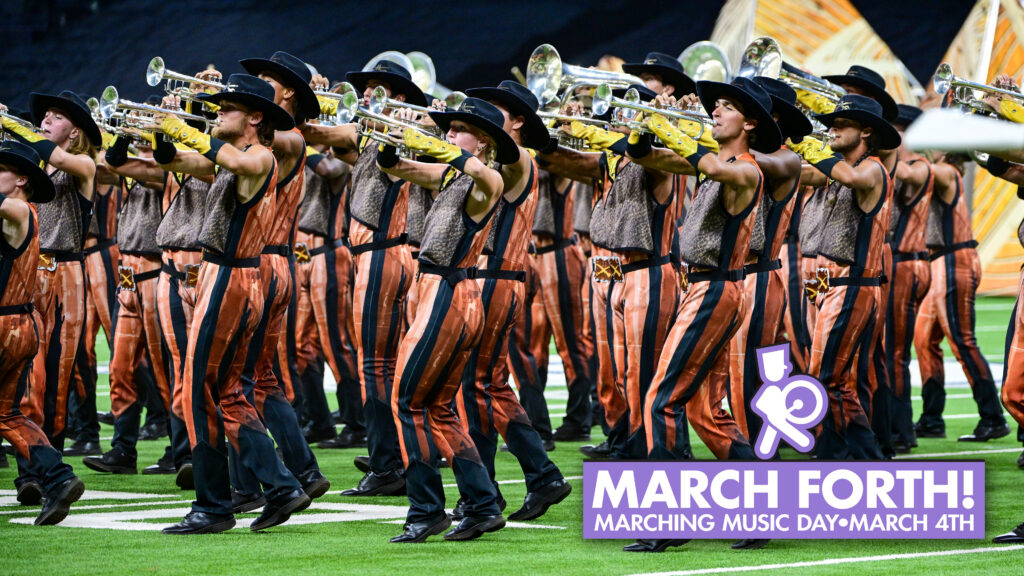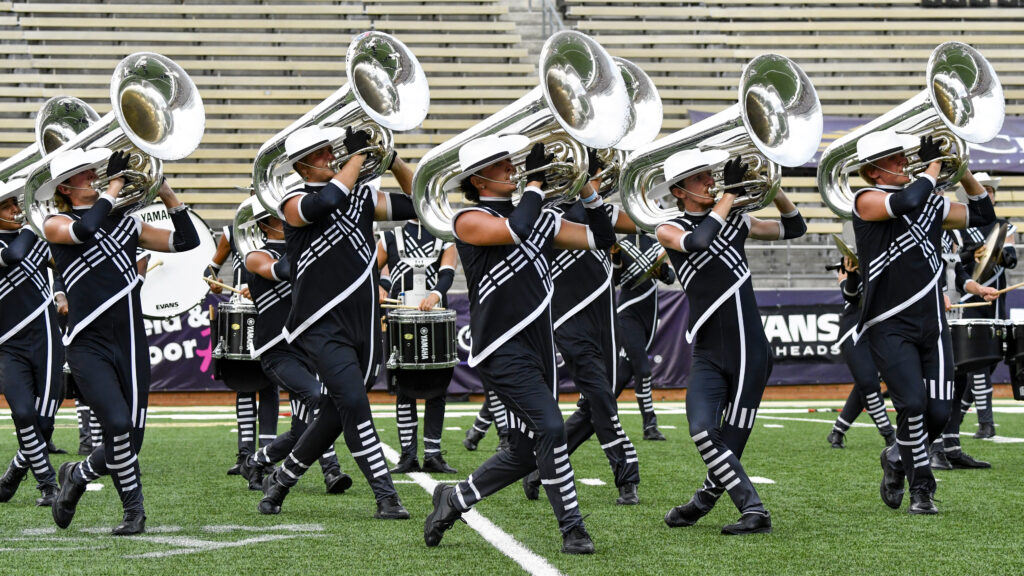Doug Rutherford, long a drum corps fixture and a co-founder of Rivermine Software submitted the following remarkable story. The drum corps connections of everyone involved play strongly throughout. This story wraps up a three-week triptych of stories about drum corps cancer survivors.
The main individuals in this article have a connection to the Cadets. Kevin Dunetz was a lead soprano in the Garfield Cadets in 1986 and 1987. He has a degree in Electrical Engineering from Virginia Tech and is a co-founder of Rivermine Software. David Welch was a lead mellophone in Garfield Cadets from 1984 through 1987, has an industrial and systems engineering degree from Virginia Tech and is also a co-founder of Rivermine Software. I’m Doug Rutherford. I played baritone and became drum major of the Garfield Cadets, marching 1984 through 1988. I was later on the management teams of the Cadets, Dutch Boy and Phantom Regiment. Like my two friends above, I’m also a co-founder of Rivermine Software. David and I have known one another since the late 1970s when we were on the same sixth grade soccer team. We played in the same high school band and then marched together at the Cadets. David and Kevin played in the 1983 Virginia All-State Band together and later met at Virginia Tech. David brought Kevin to Garfield and all three of us marched in the corps together. We all got along well and established the typical deep bonds found in the drum corps experience. During the summer of 2001, Kevin brought David and I together and proposed that we start a company, as all three of us have deep experience in high technology and telecommunications. We decided to start a company that displays the positive attributes of teamwork, commitment and a tireless pursuit of excellence because we have seen many of our own professional experiences fall short of what we know is possible from our days in the Cadets together. On Oct. 15, 2001, we were all working in a room with a folding card table. We founded a company that sells software to manage corporate voice and data networks. This is an area in business that had been ignored for years because it is so incredibly complex to solve these telecom issues. In our company, the analogies to drum corps are constant and we constantly find many others who buy into our approach. Over the past five years, a stunning number of people who were in drum corps pitched in along the way. Someone who played quad tenors in Florida Vanguard and Blue Devils heavily influenced one of our first large deals. Another critical deal was won thanks to the influence of a woman who marched in the WGI-competing Red Diamonds and played triple tenors in drum corps. We hired DCI board member Steve Auditore as a marketing consultant. There are band people everywhere in the technology industry. The examples go on and on. Fast forward to Dec. 6, 2004. Rivermine Software has more than 50 employees, major investors and has sold millions of dollars of software to companies like Starbucks, Marriott, Circuit City and many others. I was vice president of marketing, Kevin was chief technology officer and David was vice president of operations. David came in one Monday morning looking awful and not as sharp as usual. After much cajoling, he checked into the emergency room of a local hospital. At 1 a.m., he called to inform me that he had been diagnosed with brain cancer! It turned out he had a lemon-sized brain tumor. The next day was Dec. 7 (a day that will live in infamy). This was rally time. David’s family was with him and the network kicked in. I spoke with Steve Auditore, whose family had been impacted by cancer. Steve immediately referred me to Star of Indiana founder Bill Cook, who also founded a company that deals with radiologists. We had known each other since 1984, and I called him about David’s situation. Bill turned me on to one of the top radiologists in the United States, who in turn got the David Welch “Brain Cancer Team” connected with other top doctors. I notified the Cadets’ director George Hopkins of the situation and he posted it on his blog. Brian Wilkie (Garfield Cadet lead soprano from 1983-1985) read about the situation on the Web. (David and Brian marched next to each other at the beginning of “America” in 1984.) Brian contacted David to let him know about Dr. Patrick Kelly at New York University, who is regarded as one of the three top neurosurgeons in the world. Brian knows this neurosurgeon because he successfully operated on the son of his next-door neighbor. I then contacted Dr. Ed DiCarlo, then chairman of the board for YEA!, to check out what he knew about the NYU surgeon. He did not know him personally, but had heard that Dr. Kelly was top notch. Grant Davis, who taught Garfield in 1984, is now on the YEA! board and is a cancer survivor himself, provided invaluable information to David; including a list of what to do and what not to do in dealing with treatment for cancer. Nadia Younes (lead mellophone of Garfield Cadets in 1983 and 1984 who marched next to David) also reached out to David. She is another cancer survivor and had additional perspective and support that was important to David as he considered what to do next. David’s parents did most of the legwork to find the very best medical team to treat David. The surgeon that Brian recommended is the leading pioneer in the world on the type of tumor David has. Every other neurosurgeon David visited said that this brain tumor was inoperable, except Dr. Kelly (who also played saxophone in the University of Michigan Marching band, way back when). Outreach from legions of Cadets was incredible. Just see www.38lemon.com on the messages tab to see the types of comments that were offered. Over six generations of Cadets reached out in support. Prayers of support were offered at the Most Holy Name Catholic Church, of all places (This was the founding church of The Cadets, originally known as the Holy Name Cadets). May 5, 2005, was Cinco de Mayo. David had brain surgery and had about 50 percent of his tumor removed at NYU. The main drum corps connection there was one of the nurses who prepped David for surgery, supported his parents throughout his surgery (like slipping them food from a favorite deli during surgery) and helped while David was in the intensive care unit. Her name? Christina Tserkis Brown, a Garfield Cadets soprano player in 1987. Want more weirdness? Christina’s younger sister, Lisa Tserkis Ferrari, marched with the Cadets for three years and was mellophone soloist in 1995. Want something even weirder? I introduced David to Lisa Tserkis Ferrari at a DCI competition in years past, and David then used her as a trumpet sub with his brass quintet for the past several years—not even knowing that Lisa had a sister who also marched with Garfield. It was totally unreal.

Today, David is 13 months into a 24-month chemotherapy treatment that appears to be reducing the size of his visible brain tumor. Currently, there is no cure for David’s type of brain cancer. However, he is actively working to support the efforts of those like the Lance Armstrong Foundation—applying the same approach that led to multiple DCI Championships and growing a software company—to make sure that brain cancer is diagnosed sooner and is managed as a chronic disease, rather than a death sentence. Doug and Kevin are full-time employees at Rivermine, working hard to grow the company using the same principles and concepts that were consciously and specifically agreed upon when the company was founded. How does all this relate to drum corps? All three of us feel strongly that our drum corps experience—like the experiences of kids across all drum corps—is critical to who we are today. Further, the relationships we established during those years have remained important to our daily lives. No matter how those relationships manifest themselves, they are lasting and available to us all. It is clearly important to remember to be good to everyone you come in contact with and burn no bridges. That quiet soprano player might become your business partner and another member of the brass line who you hardly knew may be the one holding a scalpel when it comes time for surgery to save your life.





